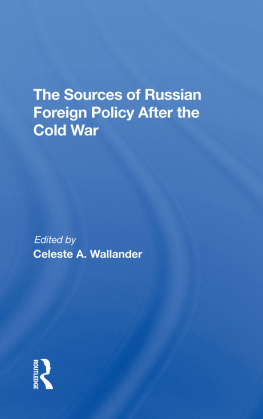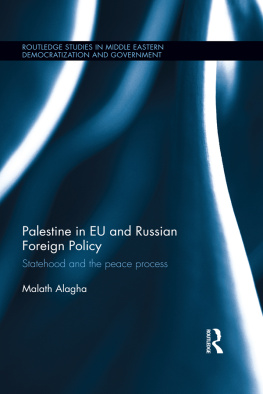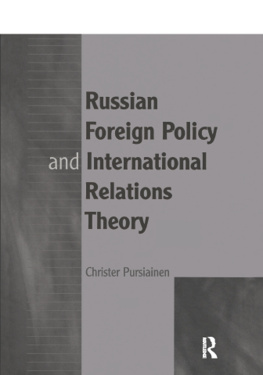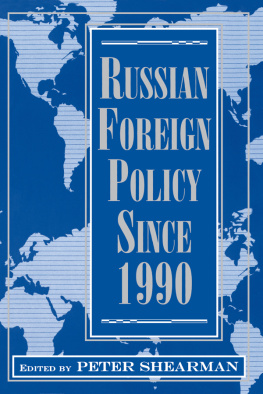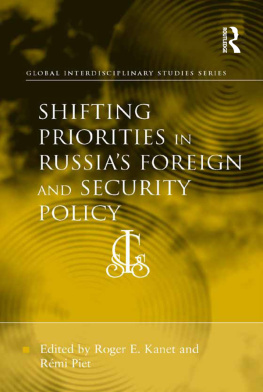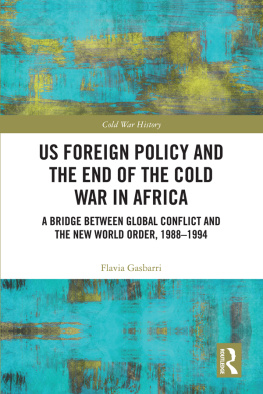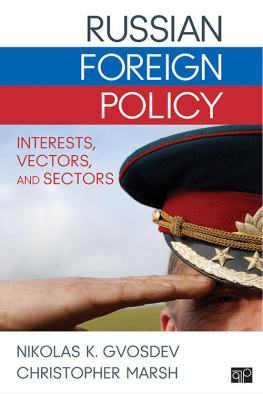The Sources of Russian Foreign Policy After the Cold War
The John M. Olin Critical Issues Series
Published in cooperation with The Harvard University Russian Research Center
The Sources of Russian Foreign Policy After the Cold War, edited by Celeste A. Wallander
Patterns in Post-Soviet Leadership, edited by Timothy J. Colton and Robert C. Tucker
Central Asia in Historical Perspective, edited by Beatrice F. Manz
In Search of Pluralism: Soviet and Post-Soviet Politics, edited by Carol R. Saivetz and Anthony Jones
Soviet Social Problems, edited by Anthony Jones, Walter D. Connor, and David E. Powell
The Nationalities Factor in Soviet Politics and Society, edited by Lubomyr Hajda and Mark Beissinger
The Soviet Union in the Third World, edited by Carol R. Saivetz
The Sources of Russian Foreign Policy After the Cold War
Edited by
Celeste A. Wallander
First published 1998 by Westview Press, Inc.
Published 2019 by Routledge
52 Vanderbilt Avenue, New York, NY 10017
2 Park Square, Milton Park, Abingdon, Oxon OX14 4RN
Routledge is an imprint of the Taylor & Francis Group, an informa business
Copyright 1996 by the Harvard University Russian Research Center
All rights reserved. No part of this book may be reprinted or reproduced or utilised in any form or by any electronic, mechanical, or other means, now known or hereafter invented, including photocopying and recording, or in any information storage or retrieval system, without permission in writing from the publishers.
Notice:
Product or corporate names may be trademarks or registered trademarks, and are used only for identification and explanation without intent to infringe.
Library of Congress Cataloging-in-Publication Data
The sources of Russian foreign policy after the Cold War / edited by Celeste A. Wallander.
p. cm. (John M. Olin critical issues series)
Includes index.
ISBN 0-8133-8841-4. ISBN 0-8133-2833-0 (pbk.)
1. Russia (Federation)Foreign relations1991- 2. Nationalism Russia (Federation) I. Wallander, Celeste A. II. Series.
DK510.764.S68 1996
327.47'009'049dc20
95-47101
CIP
ISBN 13: 978-0-367-29590-5 (hbk)
To Nat and Joey, who contributed to delays and make my life wonderful
Contents
, Celeste A. Wallander
, Jack Snyder
, Astrid S. Tuminez
, James Richter
Kimberly Marten Zisk
, Bruce D. Porter
, Ted Hopf
, Matthew Evangelista
, Celeste A. Wallander
The chapters in this book were originally presented in the 1993-1994 John M. Olin Critical Issues Series at Harvard University's Russian Research Center. In addition, several of the draft chapters were presented as a panel at the 1994 annual meeting of the International Studies Association in Washington, D.C. The seminar series, travel to the ISA convention, and the preparation of this manuscript were supported by a generous grant from the John M. Olin Foundation.
Many members and friends of the Russian Research Center contributed to the successful operation of the seminar series and the production of this volume. I want to thank Tim Colton, director of the Russian Research Center, for supporting the study of Russian foreign policy at the center in general and for endorsing my proposal for this series. Good research requires insightful analysis and critique, and a number of scholars provided that assistance to the authors. Joel Hellman, Douglas Blum, Randall Stone, Robert Darst, Josephine Andrews, and Carol Saivetz served as discussants for the seminar series, and Jeffrey Knopf and Jeffrey Checkel were the discussants for the ISA panel. Lisbeth Bernstein, associate director, and Christine Porto, head administrative officer, were encouraging and helpful at every turn. I would have been incapable of organizing the series without the administrative assistance and constant good cheer of Michele Albanese, Alan Fortescue, and Judy Mehrmann. And finally, the entire project was rescued by the arrival and skill of Anne Wildermuth, who transformed the diverse writings of eight academics into a readable whole
Celeste . Wallander
The Sources of Russian Foreign Policy After the Cold War
Chapter 1
The Sources of Russian Conduct: Theories, Frameworks, and Approaches
Celeste A. Wallander
Faced with the disappearance of the Soviet Union and the task of understanding and explaining Russian foreign policies, scholars can pursue one of two broad options. The first optionand the focus of most discussion and publication since December 1991is description and documentation of Russian policy. The second option is explicitly and self-consciously theoretical and is less well represented in recent work. It begins with theoretical constructs rather than substantive policy concerns. Although this is not a purely academic exercise, researchers following this approach are less focused upon the policy itself and more intent on the dynamic processes of policy formation, evolution, and change
The advantage of the first approach lies in its concrete and fine-tuned exploration of the substantive context of Russian policy. Its weakness is twofold: It can become easily dated, and it cannot produce generalizable insights on Russian foreign policy. The weakness of the more theory-based approach is that it is unlikely to be useful as a direct guide to the content of policy. However, if done well, it will provide a more substantial basis for long-term and more general explanation. The contributing authors to this volume adopt a theory-focused approach to Russian foreign policy. They examine seven theoretical models that have been important in the study of Soviet foreign policy. These models focus on the impact of different factors on Russian foreign policy: type of government, ideology, leadership politics, bureaucratic and interest group politics, the European security system, Russia's historic borderlands and "empire," and the international economic system.
Increasing Access, Increasing Dissent: How Theory Guides Interpretation
Unlike researchers during the Soviet period, scholars no longer face the same severe restrictions on access to information about Russian foreign policy. Although Russia's political system is not a democratic one, its combination of greater openness with competing political sources has expanded our access to informa
Most current disagreement about Russian foreign policy among U.S. scholars and policymakers arises not from varying access to information, which is generally available to any researcher, but on interpretation of events and explanation of the sources of behavior. For example, the influential journal Foreign Affairs has published many articles since 1991 in which authors disagree substantially on what Russia is up to in its foreign relations and on whether the United States should adopt a cooperative, competitive, or even hostile position toward the country. For the most part, however, the authors agree on the basic facts: that the Yeltsin government is beset by economic and political problems of enormous dimensions and complexity and that Russian foreign policy has become more assertive and confrontational. Different policy prescriptions arise not from attention to different facts but from implicit explanatory models that try to make sense of what the available information means. These questions can be answered only by an understanding of how the Russian government operates, what are its bases of support, the relationship of society and interest groups to Russian political authority, and the relationship of Russian domestic politics to its foreign policy.


